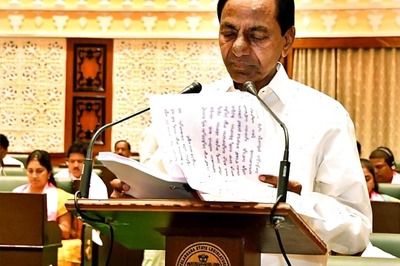
views
ABBOTSFORD, British Columbia:Helicopters dropped food to people in towns cut off by massive floods and mudslides in the Canadian province of British Columbia on Wednesday as some regions braced for more rain in the next few days.
Mudslides destroyed roads and bridges and severed access to the country’s largest port in Vancouver, disrupting global supply chains already struggling to deal with problems caused by COVID-19.
In Tulameen, a mountain town to the northeast of Vancouver, up to 400 people are trapped, many without power, said Erick Thompson, a spokesman for the area’s emergency operations.
“(We) did a helicopter flight recently, dropped off food, and what is underway right now is to determine what additional supplies may need to come into that community,” he told the Canadian Broadcasting Corp.
Some of the towns are in more remote mountain areas with limited access and freezing temperatures, making them more vulnerable.
In Hope, 100 miles (160 km) east of Vancouver, food was starting to run low. Pastor Jeff Kuhn said a quarter of the town’s 6,000 residents were seeking shelter.
About 100 volunteers at the Dukh Nivaran Sahib Gurdwara Sikh Temple in Surrey spent all night Tuesday preparing about 3,000 meals and then hired helicopters to deliver the food to Hope, said President Narinder Singh Walia.
“We don’t want anyone to sleep hungry,” he said by phone, adding that volunteers were planning to make another 3,000 meals Wednesday night.
The disaster could be one of the most expensive https://www.reuters.com/world/americas/canadas-10-costliest-natural-disasters-by-insurance-claims-2021-11-17 in Canadian history.
Canadian exporters of commodities from grain to fertilizer and oil scrambled to divert shipments away from Vancouver but found few easy alternatives https://www.reuters.com/business/canadian-shippers-find-few-easy-alternatives-grain-oil-cut-off-by-flood-2021-11-17.
After a phenomenon known as an atmospheric river https://www.reuters.com/world/americas/how-river-sky-caused-massive-flooding-canada-2021-11-17 dumped a month’s worth of rain in two days, officials are concerned that another downpour could overwhelm a pumping station near Abbotsford, a city of 160,000 to the east of Vancouver, which has already been partly evacuated.
Mayor Henry Braun said the station was running at full capacity. Volunteers built a dam around the station overnight, he said.
“That will buy us some more time but if we had another weather event like we just went through, we are in deep doo-doo (trouble),” he told reporters on Wednesday.
Farmers in Abbotsford ignored an evacuation order on Tuesday and desperately tried to save their animals from rising waters, in some cases tying ropes around the necks of cows https://www.reuters.com/article/us-canada-flood-cattle/small-navy-of-farmers-stage-cow-rescue-in-flood-hit-british-columbia-idUSKBN2I220A and pulling them to higher ground.
Environment Canada said Abbotsford would receive more rain early next week.
Rescuer Mike Danks, part of an Abbotsford evacuation team, said the situation had been very tough.
“The majority of people had elderly parents with them that were unable to walk, suffered from dementia,” he told local outlet Black Press Media.
“You’re trying to assist them into a helicopter at night, bringing only a very small amount of stuff.”
In Mission, to the east of Vancouver, some emergency staff are stuck in their own homes, said Mayor Paul Horn.
“All of the five roads into this area … are blocked and that’s making it very challenging to get goods in and out of the area,” he told CBC.
‘TERRIFICALLY BAD SITUATION’
Prime Minister Justin Trudeau, while in Washington on a trip, said Ottawa would help the province recover from what he called a “terrifically bad situation”.
Federal Emergency Preparedness Minister Bill Blair said the air force would move food, fuel, feed and water and supplies to communities while helping with sandbagging.
The flooding is the second weather-related calamity to hit British Columbia in the last few months. A massive wildfire https://www.reuters.com/business/environment/canadas-infernal-summer-puts-climate-change-forefront-election-2021-09-01 in the same region as some of the devastation destroyed an entire town in late June.
Environmental scientists say wildfires are becoming more frequent and larger due to climate change. Combined with drought that has hit the province, the fires can limit the ability of soil and vegetation to absorb large amounts of water.
Canadian Pacific Rail and Canadian National Railway, the country’s two biggest rail companies, said their lines into Vancouver remained unusable on Wednesday.
Vancouver’s port moves C$550 million ($440 million) worth of cargo each day, ranging from automobiles to containers packed with essential commodities.
Disclaimer: This post has been auto-published from an agency feed without any modifications to the text and has not been reviewed by an editor
Read all the Latest News here



















Comments
0 comment